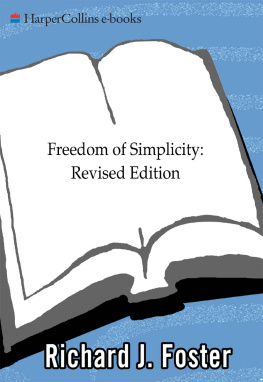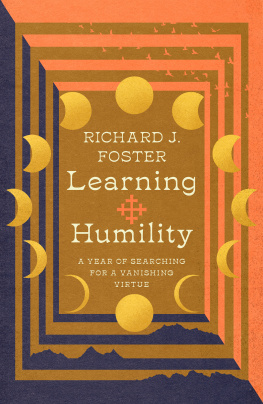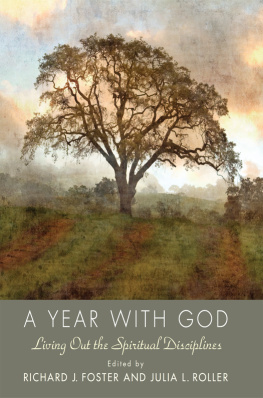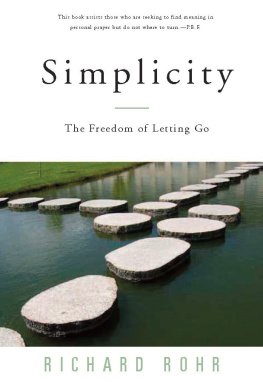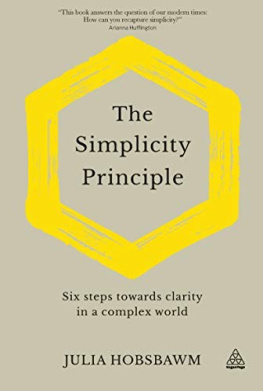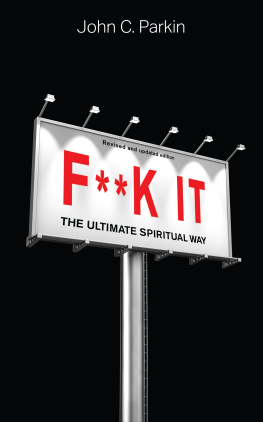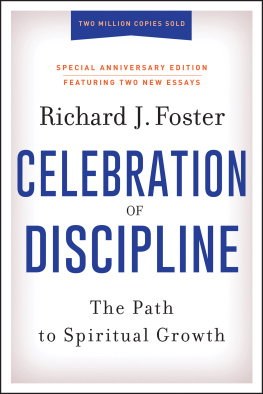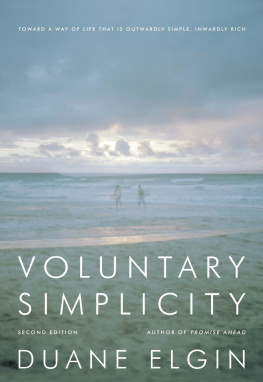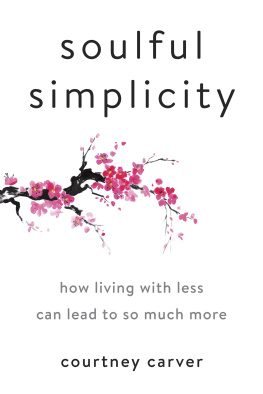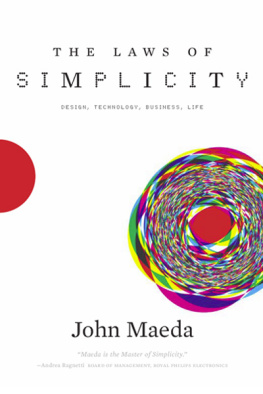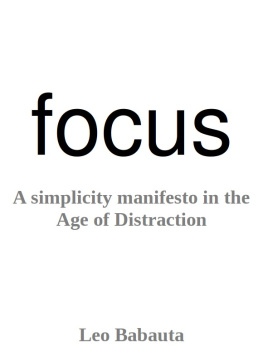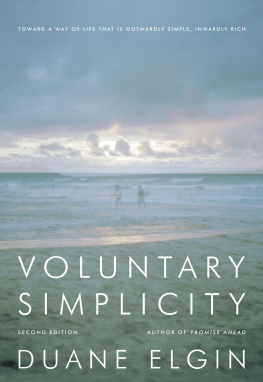Richard J. Foster - Freedom of Simplicity: Finding Harmony in a Complex World
Here you can read online Richard J. Foster - Freedom of Simplicity: Finding Harmony in a Complex World full text of the book (entire story) in english for free. Download pdf and epub, get meaning, cover and reviews about this ebook. year: 2010, publisher: HarperCollins, genre: Religion. Description of the work, (preface) as well as reviews are available. Best literature library LitArk.com created for fans of good reading and offers a wide selection of genres:
Romance novel
Science fiction
Adventure
Detective
Science
History
Home and family
Prose
Art
Politics
Computer
Non-fiction
Religion
Business
Children
Humor
Choose a favorite category and find really read worthwhile books. Enjoy immersion in the world of imagination, feel the emotions of the characters or learn something new for yourself, make an fascinating discovery.
- Book:Freedom of Simplicity: Finding Harmony in a Complex World
- Author:
- Publisher:HarperCollins
- Genre:
- Year:2010
- Rating:3 / 5
- Favourites:Add to favourites
- Your mark:
- 60
- 1
- 2
- 3
- 4
- 5
Freedom of Simplicity: Finding Harmony in a Complex World: summary, description and annotation
We offer to read an annotation, description, summary or preface (depends on what the author of the book "Freedom of Simplicity: Finding Harmony in a Complex World" wrote himself). If you haven't found the necessary information about the book — write in the comments, we will try to find it.
Freedom of Simplicity: Finding Harmony in a Complex World — read online for free the complete book (whole text) full work
Below is the text of the book, divided by pages. System saving the place of the last page read, allows you to conveniently read the book "Freedom of Simplicity: Finding Harmony in a Complex World" online for free, without having to search again every time where you left off. Put a bookmark, and you can go to the page where you finished reading at any time.
Font size:
Interval:
Bookmark:

To Dallas Willard, whose life reflects the grace of
simplicity in all its manifold complexity.
Simplicity of life is one of those realities we grow into over extended periods of time. Now, twenty-five years after this book was first published, what do I know as regards this life? I know both less and more. I am less certain about how it all works and more clear on the Center that animates all life. When I titled the first chapter of this book The Complexity of Simplicity, I understood that reality mostly in theory; I now know it more deeply as lived experience. The intricacies and the difficulties remain in abundanceindeed, even more sonow that I have lived a couple more decades into the conundrums of life. Frankly, the inward query, What do I know? is on my lips often these days.
And yet, through it all, the title I gave to the Epilogue, The Simplicity of Simplicity, is more real than ever. I see. I know. We can live with a steady attention to the voice of the true Shepherd. We can seek first Gods kingdom. We can enter into Gods righteousness. We can walk cheerfully over the earth. We can live simply and profoundly.
Richard J. Foster
November 1, 2004
PREFACE from the 1981 EDITION
This is not a book that I was automatically drawn to write. I was, in fact, brought all but kicking and screaming to this task. I did in the end write it, but it is perhaps not irrelevant to note the reasons for my hesitancy.
First, there was the matter of my own experience in simplicity, or lack thereof. Did I know enough of the inner reality of simplicity to write with any degree of integrity? How deeply rooted was I in this life of unhurried peace and power? And then there was the matter of lifestyle. Carolynn and I still struggle with decisions about money and possessions. By no stretch of the imagination do we have the final answer on what to buy or what to do without. And what about the corporate nature of simplicity? How could I, with any measure of competence, address the tangled issues of economics and world hunger and international trade? I felt, and do feel, like a beginner in all the varied aspects of simplicity.
Second, I hesitated because I know that Christian simplicity is a terribly complex matter. That is understandable, if paradoxical. Seldom in life is there any issue of significance that will yield to easy answers. Not only must we understand the biblical witness to simplicity and the rich tradition of the devotional masters, but we must interact with the contemporary issues. Further, it is necessary to boil all these matters down into the practical world in which we livea world of schedules and demands, a world of bills and budgets. And this is no simple task.
Third, I was concerned about the danger of legalism. Simplicity is the most outward of all the Spiritual Disciplines, and hence the most susceptible to corruption. How could I be specific without being rigid? How could I call people from greed without introducing a new pharisaism?
I had a fourth reason that made me cautious about writing a book on simplicity. Of the four, this one was my greatest concern, and the one to which I give attention in Chapter 1.
Lyle SmithGraybeal has been the key figure in the rewrite work for this revision of Freedom of Simplicity. He went through the entire manuscript, updating statistics and illustrations and correcting misstatements. He then composed the first draft for the complete rewrite of Chapter 10, Corporate Simplicity: The World. It was here that his training in economic theory shone brightly. While I have recast and reworked and rewritten the chapter (and am therefore responsible for any of its deficiencies), I want to acknowledge the excellent work of Mr. SmithGraybeal in crafting the ideas contained in Chapter 10.
ACKNOWLEDGMENTS
from the 1981 EDITION
Anyone who writes knows that an authors family always bears the greatest burden of sacrifice in the publication of a book. My wife, Carolynn, bore patiently my year-long obsession with the topic of simplicity. During the final months of writing, she took over all of my responsibilities at home and literally was mother and father to our boys. I thank her. Joel and Nathan were keenly interested in the progress of the book, and somehow always seemed to understand when the soccer game with Dad had to be cut short. We had many exciting and lengthy soccer games after the writing was done, even if I continued to lose every one of them.
The relationship between an author and an editor is unique. Roy M. Carlisle, my editor at Harper & Row, has an unusual ability to guide without dominating, to encourage without flattering, and to correct without discouraging. On several occasions his perceptive comments have opened up an entirely new creative direction for the book, for which I am grateful.
I was privileged to attend the International Consultation on Simple Lifestyle held at Hoddesdon, England, in March of 1980. The many Christian friends from around the world whom I met at that gathering helped me to see the infinite variety of faithful witnesses to the life of simplicity.
My deep appreciation goes to Dorothy Craven, Professor of English, Emeritus, at Friends University, who read the entire manuscript and made many helpful suggestions. My thanks also to a small literary group at Friends University who listened as I read much of the text of this book and encouraged me in its writing.
Numerous people read all or part of the manuscript and gave valuable suggestions. They include Kenneth Boulding, Harold Friesen, Verlin Hinshaw, Howard Macy, Raymond Nelson, and Tom Rozof. My thanks to Leroy Brightup and Harold Cope, who encouraged me throughout this project; and to Marilyn Pitts and Wanda Payne, who did the typing.
These and the many others who have surrounded my life have helped give shape to this book. I owe them an immense debt. They are the living voice of the Church vita vox ecclesiae .
Seek simplicityand distrust it.
Alfred North Whitehead
C ontemporary culture is plagued by the passion to possess. The unreasoned boast abounds that the good life is found in accumulation, that more is better. Indeed, we often accept this notion without question, with the result that the lust for affluence in contemporary society has become psychotic: it has completely lost touch with reality. Furthermore, the pace of the modern world accentuates our sense of being fractured and fragmented. We feel strained, hurried, breathless. The complexity of rushing to achieve and accumulate more and more threatens frequently to overwhelm us; it seems there is no escape from the rat race.
Christian simplicity frees us from this modern mania. It brings sanity to our compulsive extravagance, and peace to our frantic spirit. It liberates us from what William Penn called cumber. It allows us to see material things for what they aregoods to enhance life, not to oppress life. People once again become more important than possessions. Simplicity enables us to live lives of integrity in the face of the terrible realities of our global village.
Christian simplicity is not just a faddish attempt to respond to the ecological holocaust that threatens to engulf us, nor is it born out of a frustration with technocratic obesity. It is a call given to every Christian. The witness to simplicity is profoundly rooted in the biblical tradition, and most perfectly exemplified in the life of Jesus Christ. In one form or another, all the devotional masters have stressed its essential nature. It is a natural and necessary outflow of the Good News of the Gospel having taken root in our lives.
Font size:
Interval:
Bookmark:
Similar books «Freedom of Simplicity: Finding Harmony in a Complex World»
Look at similar books to Freedom of Simplicity: Finding Harmony in a Complex World. We have selected literature similar in name and meaning in the hope of providing readers with more options to find new, interesting, not yet read works.
Discussion, reviews of the book Freedom of Simplicity: Finding Harmony in a Complex World and just readers' own opinions. Leave your comments, write what you think about the work, its meaning or the main characters. Specify what exactly you liked and what you didn't like, and why you think so.

